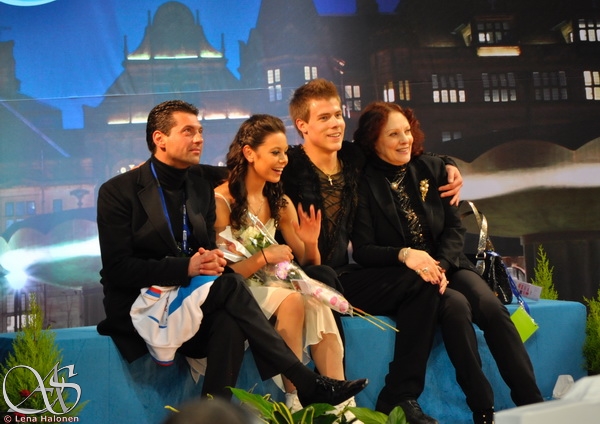Nikolai Morozov: "I don't know what I'm going to do after the Olympics, but I definitely need to rest."
February 9, 2014
By Lena Halonen
Photos © Lena Halonen, Oxana Shkrebtienko, Mireille Geurts, Joy, Eva Maria Jangbro (EMJO)
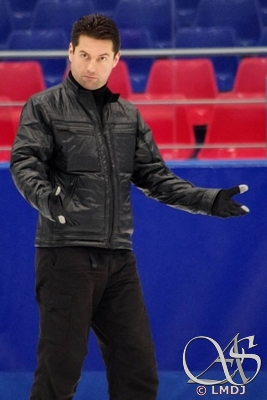 Nikolai Morozov has been working as a coach and choreographer for 14 years, and is probably known to most people with any interest in figure skating. He’s taken on students from the whole world, but the last few years he has been working mostly with Russian skaters. As the Olympics in Sochi drew closer he was asked to leave USA, where he had had his home base, and return to Russia. After the men’s event in Budapest I sat down for a talk with him.
Nikolai Morozov has been working as a coach and choreographer for 14 years, and is probably known to most people with any interest in figure skating. He’s taken on students from the whole world, but the last few years he has been working mostly with Russian skaters. As the Olympics in Sochi drew closer he was asked to leave USA, where he had had his home base, and return to Russia. After the men’s event in Budapest I sat down for a talk with him.
How come you always coach/choreograph for so many skaters?
Because a lot of skaters ask me for help, and I like to help as much as I can. But I cannot even work with all who ask because it’s physically impossible. I have had many disciplines and skaters for a long time.
Who all are you coaching/choreographing for now?
Elena Ilinykh / Nikita Katsalapov, Alena Leonova, Daisuke Takahashi, Brian Joubert (that started after New Year’s), Artur Dimitriev and Abzal Rakimgaliev. I’m choreographing for the Russian pair teams Vera Bazarova / Yuri Larionov and Tatiana Volosozhar / Maxim Trankov, Ksenia Stolbova / Feodor Klimov, and for Qing Pang / Jian Tong. I haven’t choreographed for Daisuke, but with Brian I changed the short program.
Do you work alone or together with someone?
I work alone, but of course Brian Joubert and Daisuke Takahashi have their own coaches who come with them. It is not like I’m the only one working with them.
What do you prefer, choreographing under the new or the old system?
I think people do more intriguing things now, harder things. But I prefer the older system because when you choreographed you just went with an idea and turned it into something, it was more art. Now when we do footwork, which is a big part of the choreography, it is harder because you have particular elements that must be included. All the skaters have to do the same elements, but can do it in a different order. So there is less concentration on what you want to show with the music. It’s harder to choreograph and more difficult to skate, but if you do a good job everybody will like the program and the musicality. And I think skaters grow a lot with this new system. The men’s event, for example, is unbelievable. Watch Worlds or the Olympics; it is so exciting! The guys have different styles, different music choices, different choreography… it is great!
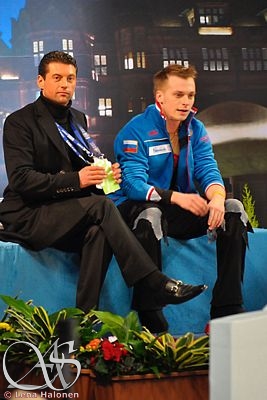

How much do you work together with the skaters on ideas, choreography, and music choices?
A lot, but it depends on the skater. Some skaters are very into it, and some are not. It’s not like they don’t care, it all depends on the personality. I work with them and always try to find programs that will be good for this specific skater. Like Brian, he is more of a strong skater compared to Daisuke, who is more lyrical. I could not switch their programs, it is better to choose something for their individual style.
Is that even more important during an Olympic season?
Yes, now is not the time to try something new, you need to already know what works for the skater.
But if a skater wants to develop, isn’t it good to try something different?
It is good, but in my opinion the Olympic year is not the time. Skaters have many years to skate in the future so I think the Olympians should stay with the most comfortable way of their body movement.
There are many levels of difficulty in the new system. Especially in ice dance it happens that couples get low levels in one competition, and higher in the next for doing the same thing. Is it more difficult with levels in ice dance?
No, I think this happens because everybody has a different opinion. People read the rules and know what they are trying to achieve. For me it is sometimes surprising when a good couple, like I have, with great quality skating, get level two footwork, when you see couples from 15th and 16th place getting level three, and their ability is less. I think ice dancing is also very political, I mean you can fight real hard for the levels, but you will never know the outcome. It is not like in singles where you did a jump or you didn’t do a jump, you cheated a jump or did a clean jump. But it is figure skating and it has always been like this, even with the old system.
Did ice dance lose something with the taking away of the compulsories?
I think we will notice in the future. All the current top senior couples did compulsory dancing so to know if it was really a good thing or not we will have to wait for the skaters who never did compulsories. It was the same with the single’s figures; I think people had more knowledge of skating than they do now. If you didn’t stay in the right position you would not be able to do figures. If you asked some of the top single skaters today, they would not be able to do figures.
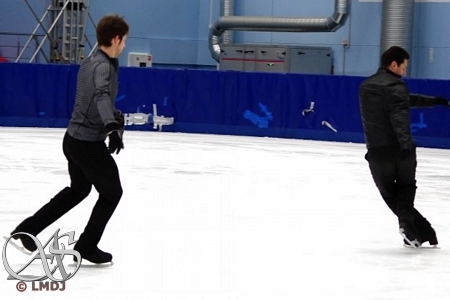 Did you do figures when you started skating?
Did you do figures when you started skating?
Of course, I was like 15-16 when they took them away.
Your programs are often criticized and sometimes called front loaded (meaning all the jumps are in the beginning).
It all depends on the skater. People in skating always criticize, but I really don’t read those things. The best way of showing figure skating is by results. I have had skaters who would not be able to skate clean if I loaded their programs with lots of foot work, for example Miki Ando. She wasn’t so soft, but she had other great qualities. My job was not to try to make the program as hard as possible, because then she would never have become a two time World Champion, but she did!
I don’t care what people say and I don’t read it, because I have made so many programs in my life, maybe more than any other choreographer. I did Alexei Yagudin, Tatiana and Maxim, Michelle Kwan, Sasha Cohen, Shizuka Arakawa… programs that people will remember for a long time, also Brian Joubert, Florent Amodio. Every year I have something, I don’t think you can say that about anybody else.
But most of those programs are from the old system.
Yes, but not all. And before I did programs for everybody, but for the past two years I have done programs only for my skaters and for Russian skaters. Elena and Nikita have one of the better programs this year. It’s not about the new or old system; it’s about the skater matching the program and the music.
What do you do to develop as a coach and choreographer?
I watch a lot of shows and sometime go dancing myself. Working with different athletes is an opportunity to study each individual. Each skater now has his own face since it is not only me teaching them, I am also studying them. They all have different ways of moving and that is interesting too. I help them grow but I also grow with them.
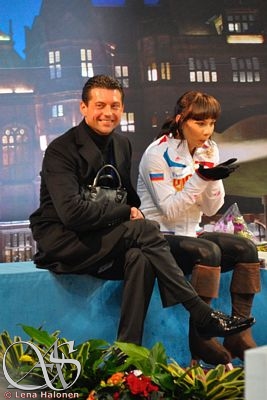 Alena Leonova wrote about you in her blog: “in his opinion night time is the right time for choreography.”
Alena Leonova wrote about you in her blog: “in his opinion night time is the right time for choreography.”
Because when I work in the US for the summer, it is very hard to do programs during the day when the ice is always so busy. But I’m allowed to skate at night, and it’s not because I want to but because I have the ice to myself; I can play music as loud as I want and I can play as much as I want. There’s nobody on the ice except for me and the person I’m working with for three – four hours.
How much time do you need to choreograph a program?
Two days. But I think any program has to be worked on a lot. We can choreograph a program, but then it’s best if we can also spend some time working on it.
About calling Brian…
With Brian it’s a different story. We worked together a long time ago and always wanted to work together. Brian called me this past summer and asked me to do his programs, but I said I couldn’t because I was working with Florent. And after we parted ways with Florent, I had a very busy autumn until the Russian Nationals and when I knew all my skaters were ready. Then I noticed that Brian wasn’t doing so well, so I decided to help him since I’ve known him for such a long time. I think Brian is a great skater and I think I can help him since we’ve always had a good relationship.
What makes you take on a skater?
When I was young, I wanted to prove everything to everybody, but now I have all the medals and I’m not taking on a student to win. Now I’m just excited about having a good relationship with my student and feeling comfortable with working with him/her. I know Brian is a great person and Daisuke is a great person. We had problems before, but we have such good relationship and respect each other and I like that. It has nothing to do with how much money someone will pay.
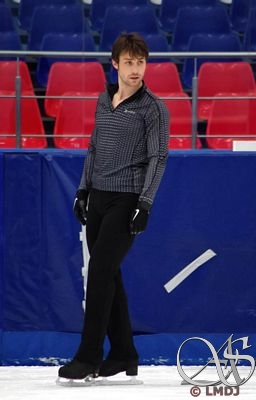
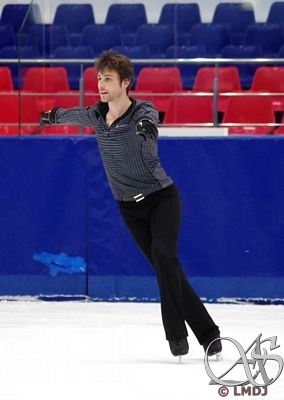
Don’t you ever think: this is someone I would like to work with!
No, not really, now the personality is the main thing. I coached Maxim Kovtun for two years and then I stopped. Sometimes I just don’t feel connected with the person or I don’t feel comfortable working with the person, and then I won’t, even if he/she is super talented.
Both Brian and Alena have changed their short programs, how come?
For me it is very easy to change a program; it takes one or two days. With Brian it took one day. You can tell if a program doesn’t work or if the skater feels uncomfortable with it. You can love your program. But if you don’t skate the program clean at a couple of competitions, then you don’t feel so comfortable. Alena only skated her short program twice and she made mistakes.
Your students seem to be very consistent, how do you do that?
I don’t know how to explain this… I skate myself so I know exactly how each step feels and I think not every coach sees what I see. I try to help every skater to be happy when they skate and then they feel comfortable with themselves. For me the best part is when a skater shows results somehow, but it doesn’t have to be placements. Brian did not medal at Europeans; he did not yet do all the difficult elements. But he skated clean and that’s important since it gave him new energy to grow even more.
What happened with Florent? I don’t think I was the only one who was surprised when you split up…
I don’t know because it was a surprise for me too. I think he wanted to stay in France, he has a girlfriend there. I’m the type of person who puts a 100 % into the things I want to do, and for the past three years it’s been my goal to make him better. A lot of times when he was in Moscow he wanted to be in France, and I told him I couldn’t spend enough time on him that way. But when he came, he was my number one skater. I also had Sergei Voronov, but Florent was so talented and so exciting. Sergei is skating for another coach now, but we are good friends. He told me he felt I wasn’t paying enough attention to him because I had Florent, and it is true I didn’t give him a 100% attention, which was what he needed. So I lost Sergei and then Florent said he wanted to stay in France. So it was hard for me since my goal was to have him medal at the Olympic Games.
You have goals for every skater; do they know about these goals?
I do have goals for each skater. Sometimes they know, and sometimes the goal is just for me. Like with Alena Leonova. I knew it would be very hard to compete with the other young Russian girls. But my first goal for her was to make it to the Europeans. Her goal was the Olympics, it is for every skater. But I can’t tell her how hard it is to get to go to the Olympics; I had to tell her we have to try to do our best. You have to work through each competition, starting with the Russian Nationals, look at what you were able to do, and feel that everything is possible. In my opinion she has done that; she’s practiced very hard, and compared to last season she’s done two great competitions.
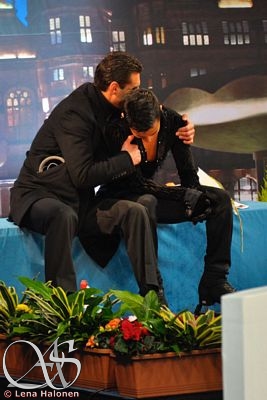 Florent used music with lyrics in Moscow. Why did you choose to do that?
Florent used music with lyrics in Moscow. Why did you choose to do that?
Even if people criticized this program, I think it was perfect for Florent. We worked with special people, and we studied Michael Jackson’s moves.
I don’t like to criticize because Stéphane Lambiel is an amazing skater and so is Brian Joubert. They have different styles and that’s why the audience loves them. Elvis Stojko was also a great skater, maybe he was a bit stiff, but he was still an amazing skater. When audiences stand up and clap for Florent, I don’t care what people are saying. I knew he could not medal at Worlds last year because his program wasn’t hard enough. He didn’t have a quad, but I knew he could skate clean so I told him to use lyrics and he agreed. And because we trusted each other a 100%; he went out and skated. I think we lost that trust later, and if I told him to use lyrics now, he would say no. And when I lose trust in a skater, it is hard for me to work with him/her.
But why did you choose to use music with lyrics?
It was fun, because with the lyrics is sounded great. A Michael Jackson piece with his voice is ten times better than without it.
But next year everybody can use music with lyrics…
And that’s why! If I hadn’t done that, it probably wouldn’t have happened! (smiles)
So what do you think of skating to lyrics?
I think it is great, and maybe it’ll attract a younger audience, which we don’t have now. Younger people watch Freestyle and newer sports. Figure skating is in trouble; there aren’t as many fans of this sport. I think skating is an amazing sport, but everything is so old fashioned; a lot of the music used today was also used 40 years ago. That is why we need change and we have it in all the different skaters with different styles. If you want dance, there’s Florent; if you want to watch beautiful skating to beautiful music, there’s Daisuke and Patrick Chan. If you want to see speed and a real man, there’s Brian; we have all these different styles and different characters!
You spend time in the US, Russia and at competitions. Do you actually live somewhere?
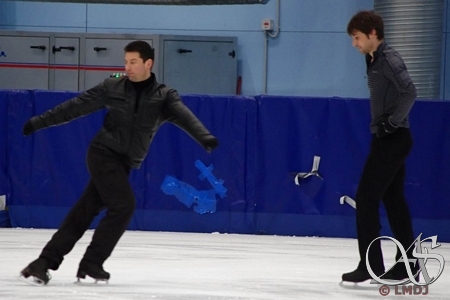 Right now I don’t live anywhere. I have an apartment in Moscow, but I don’t live there because it’s too far from the rink. In Moscow there’s such heavy traffic it takes two hours to drive to the rink outside the city. In the US it’s the same. I have a daughter who lives 40 minute from the rink but for me it’s easier to stay in a hotel next to the rink. Otherwise I wouldn’t be able to work so much.
Right now I don’t live anywhere. I have an apartment in Moscow, but I don’t live there because it’s too far from the rink. In Moscow there’s such heavy traffic it takes two hours to drive to the rink outside the city. In the US it’s the same. I have a daughter who lives 40 minute from the rink but for me it’s easier to stay in a hotel next to the rink. Otherwise I wouldn’t be able to work so much.
How often do you see your daughter, does she come to competitions with you?
Sometimes she comes to competitions, but this past year I didn’t see her much because she was practicing a lot. She actually got second place at the US Nationals (juvenile girls). Before she would go with me to Japan, but from last summer she had competitions: sectionals, regionals… I’m usually in the US during spring and summer so that’s when I see her. She misses me and I miss her.
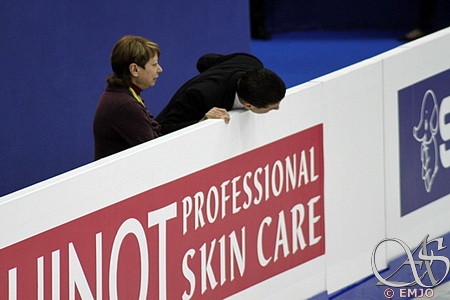 Will she come to the Olympics?
Will she come to the Olympics?
No. If I didn’t have skaters who fight for results, then my daughter could come. But I want to be able to give a 100% attention to my skaters. If you have someone visiting, you need so spend time with them, and I can’t.
What will happen after the Olympics?
I don’t know anything right now, only that I am really tired and not so excited to go to competitions anymore. I don’t know what I’m going to do after the Olympics, but I definitely need to rest.
Are you going to quit coaching?
No, no, I don’t think I will quit coaching, but I do need a break. I need to have fewer students or teach little kids; I need time to relax. There’s no time to do anything in my life, but I don’t want to think about this until after the Olympics. For sure it will be Worlds but after that… I will stay in the USA and we don’t know what will happen in Russia after the Olympics. But I am very happy I went to Russia since it was my big goal to stay and work there. I have spent 16 years in the US, so it was a big change for me to go back to Russia. Before I made my decision I also kind of didn’t see my future in the US anymore; it was the same routine every day. I wanted to do something different and I am happy I did this.
